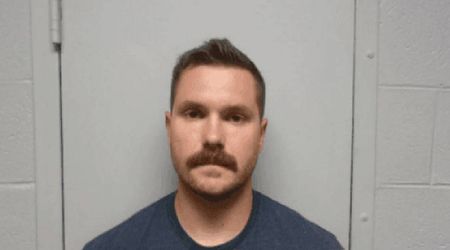Jeremy Cooper: Internet outraged as paramedic charged in Elijah McClain's death receives probation instead of prison

Warning: This article contains a recollection of crime and can be triggering to some, readers’ discretion advised.
AURORA, COLORADO: The internet expressed frustration as the former paramedic who administered a powerful sedative to Elijah McClain received probation instead of a prison sentence.
Two paramedics, Peter Cichuniec and Jeremy Cooper, along with three police officers, faced charges related to McClain's death, which occurred after he was subdued by police and injected with ketamine.
Cichuniec and Cooper, who pleaded not guilty, were found guilty of criminally negligent homicide on December 22, as per CBS 12.
Furthermore, Cichuniec was convicted of second-degree unlawful administration of drugs assault but acquitted of second-degree assault resulting in bodily injury. In contrast, Cooper was acquitted of similar charges.
What happened in Jeremy Cooper's hearing?
Jeremy Cooper, convicted of criminally negligent homicide last year, faced a potential three-year prison term.
He administered ketamine to Elijah McClain, 23, who had been forcibly restrained by the police while walking home in a Denver suburb in 2019.
The sentencing concluded a series of trials spanning seven months, resulting in the convictions of a police officer and two paramedics.
Prosecutions of paramedics and emergency medical technicians in cases involving police custody are uncommon.
The other paramedic and the officer convicted in McClain’s death received harsher penalties than Cooper because they faced additional assault charges.
During the hearing, Cooper expressed remorse, saying, "I'm sorry I couldn't save you, Elijah," as if addressing McClain directly.
He acknowledged wishing he had more knowledge at the time to assist McClain.
Sheneen McClain, Elijah McClain's mother, initially exited the courtroom during Cooper's statement but later returned.
In March, former paramedic Peter Cichuniec received the shortest sentence permitted by law, five years in prison, for criminally negligent homicide and second-degree assault, the most serious charges among the responders.
Officer Randy Roedema received a 14-month jail term for criminally negligent homicide and misdemeanor assault.
Initially, prosecutors didn't pursue charges related to McClain's death due to inconclusive autopsy results.
Democratic Gov Jared Polis ordered a reopened investigation in 2020, leading to a second autopsy, which concluded that McClain died from ketamine injection following forcible restraint.
What did Elijah McClain's mother say?
As per his sentence, Cooper will engage in a work release program for 14 months and complete 100 hours of "useful public service," as directed by Judge Mark Warner.
During the sentencing, Sheneen McClain, Elijah McClain's mother, fought back tears as she delivered her impact statement.
She accused Cooper of following "the crowd of cowards" and expressed disappointment over his apparent lack of remorse.
"I have already experienced so much and I am sure I still have much more to endure for my son," she stated.
Internet questions Jeremy Cooper's probation sentence instead of prison
After learning that the paramedic avoided prison, many individuals turned to the comment section on Instagram to share their thoughts, with a significant number posing questions about the paramedic's actions.
One user claimed, "Those tears don’t mean s**t. Why tf he’s not under a prison." [sic]
Another user added, "How does someone inject another person with ketamine …. AGAINST THEIR WILL ?!?! Insanity!"
A user added, "The judge should be removed all involved should go to prison" [sic]
One more user added, "The fact they play in our face just kills me and then slam us even if we innocent this world blows tf out me" [sic]
A user wrote, "This was the SADDEST story! Heart breaking :cry: [sic]
The last user added, "This is ridiculous! Now if it would have been a nurse or physician/provider, they would’ve put us under the jail and took our license! He should be in JAIL!!! [sic]
What happened to Elijah McClain?
On August 24, 2019, Elijah McClain was stopped during a walk and restrained by several officers until he lost consciousness.
Paramedics proceeded to administer 500 mg of ketamine without checking his vitals.
After McClain's death, which was captured on body camera footage showing him pleading for his life, nationwide outrage erupted.
The incident unfolded after a passing motorist reported observing someone described as "sketchy" to 911.
McClain, who wore a ski mask due to being anemic, was neither in danger nor armed, according to his mother.
In the body-cam footage, officers aggressively approached McClain, accusing him of being "suspicious," pushing him to the ground and applying a chokehold.
He repeatedly cried out "I can't breathe," vomited, and lost consciousness before eventually regaining it.
Upon Cichuniec and Cooper's arrival, they observed officers pushing McClain but failed to check on his condition.
Initially, Cooper suggested leaving McClain until the ambulance arrived.
After about two minutes, the paramedics diagnosed McClain with "excited delirium" without examining him or checking his vitals.
This diagnosis has faced recent criticism and is not endorsed by major medical groups.
Police wrongly accused McClain of being on drugs and having superhuman strength.
As they restrained him, Cichuniec instructed Cooper to administer ketamine.
After Cooper administered 500 mg of ketamine to McClain, exceeding the recommended dosage for his weight, McClain exhibited signs of overdose and lost consciousness.
During the trial, state attorney Shannon Stevenson explained to the jury that paramedics can only use ketamine if the patient has excited delirium and poses a danger, as per ABC News.
The prosecution argued that Cichuniec and Cooper failed to adequately assess McClain's condition before administering ketamine. They also criticized them for waiting 6 minutes before checking McClain's pulse after administering the drug.
"They intentionally injected Elijah McClain, who was laying on the ground, barely moving, struggling to breathe, with an overdose of ketamine without following a single step of their training and protocols," Stevenson said during the trial.
"They conducted no assessment. They didn't speak a word to Elijah. They didn't put a finger on him. And then they overdosed him with 150% of the dose someone his size should have gotten. And then they failed to even check on him until this pulse was gone. They knew better."
Cooper's lawyer argued that there were no clear guidelines for the situation, citing factors such as the presence of police, estimating McClain's weight with officers restraining him, determining leadership in the situation, and evaluating the possibility of excited delirium.
This article contains remarks made on the internet by individual people and organizations. MEAWW cannot confirm them independently and does not support claims or opinions being made online










